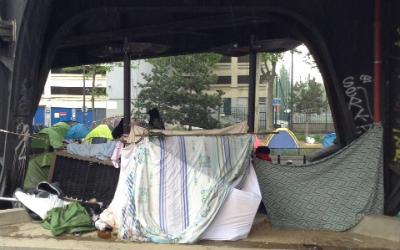Paris Workshop: ‘Calais is in Paris’
12 May 2017
Activists and researchers have increasingly recognized that the outskirts of Calais—known as ‘the jungle’—were a provisional extension of the United Kingdom, and London in particular. When the French authorities dismantled ‘the jungle,’ the contours of this transnational space revealed deep and complex links across Great Britain, France and beyond.
What were the consequences of this dismantling? What of ‘the jungle’ was re-built in Paris? And, how do researchers, professionals and activists respond to these questions, across the Channel?
 The aim of this day-long workshop is to address these issues by sharing perspectives, learning about some of the key public and civil sector initiatives in France, and mapping the relations between policy and idiom in this situation. The intended outcome is to lay the foundations for further research activity across the Channel, for which funding will need to be sought.
The aim of this day-long workshop is to address these issues by sharing perspectives, learning about some of the key public and civil sector initiatives in France, and mapping the relations between policy and idiom in this situation. The intended outcome is to lay the foundations for further research activity across the Channel, for which funding will need to be sought.
The workshop brings together researchers, practitioners, activists and artists from France and the UK for a number of talks, presentations and film screenings:
- Speakers include Pierre-Charles Hardouin and Nicola Iodice (Département des actions préventives et des publics vulnérables, Ville de Paris), Dr Emilie Duvivier (Institut social de Lille) and Dr Rathmeth Radjack (Maison de Solenn/Maison des adolescents).
- Past and ongoing research projects provide the basis for conversations, including the ULIP ‘Translation Workshops’ (carried out near the “Centre humanitaire” and the “Hildago camp” in the autumn of 2016).
- Film-screenings include ‘Here Be Dragons’ (Janekta Platun, former Leverhulme Artist in Residence, Queen Mary University of London) and 'Passing Tides' by film-makers Eithne Nightingale and Mitchell Harris.
Disclaimer: This event is part of the wider QMUL CritiQues funded project on 'Home for Refugee Children', bringing together researchers in migration and refugee-related studies from QMUL and ULIP.


